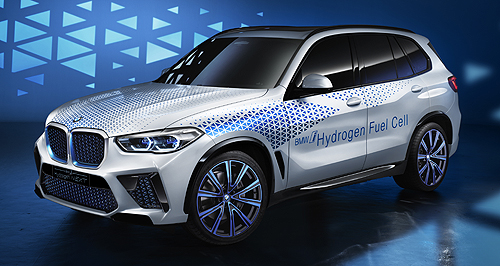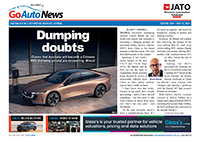Make / Model Search
Future models - BMW - i Hydrogen NextFrankfurt show: Slow burn for BMW hydrogen carsBMW’s i Hydrogen Next test car reveals the long road to the hydrogen future11 Sep 2019 BMW has admitted it is still at least six years away from launching a hydrogen-powered model, while at the same time announcing that it is accelerating its electric vehicle roll-out by two years.
However, the company insists it sees a future for hydrogen in a mix of alternative energy vehicles to suit different needs in different markets.
BMW, which is working jointly with Toyota on hydrogen fuel cell powertrains, showed off a converted X5 large SUV test vehicle with a hydrogen powertrain – dubbed BMW i Hydrogen Next – at the Frankfurt motor show this week alongside of raft of electrified models.
But BMW AG chairman of the board Oliver Zipse indicated viable hydrogen fuel cell vehicles are still some way off when he announced that BMW would launch a new fleet of fuel cell test vehicles in 2022 but would not be ready to put such vehicles on sale until 2025 “at the earliest”.
In the same breath, he announced that BMW was accelerating the launch tempo of its electric car rollout by launching 25 electrified models – half of them full electric – by 2023, which is two years earlier than the previously announced date of 2025, adding: “The timing very much depends on market requirements and overall conditions.”
Mr Zipse said BMW believe a variety of solutions – not one single technology – would provide the answer to reducing emissions in a variety of markets around the world.
“We are therefore focusing on the question: Which drivetrains, technologies and services will our customers want in the future?” he said. “And how can we achieve the best outcome for climate protection? One thing is clear: We are committed to the Paris climate agreement.”
The i Hydrogen Next looks much like a regular X5 with only small styling changes to indicate it has something different under the bonnet.
No power or performance figures were revealed, but BMW says the vehicle provided a glimpse of the test vehicles that would eventually be put on the roads with powertrains jointly developed by BMW and Toyota.
BMW is using Toyota fuel stacks in a fleet of 5 Series GT hydrogen development mules after signing a technology cooperation agreement in 2013.
BMW and Toyota say they both have faith that hydrogen vehicles will reach production, thanks to the advantages of refuelling times of under four minutes, long range, no compromises in terms of comfort, suitability for towing and little dependence on climatic conditions.
But they said these advantages will come to nothing without investment in hydrogen infrastructure.
“In most countries, such supply infrastructures are still in the early stages of development,” BMW said it is media release on the i Hydrogen Next.
Along with Honda and Hyundai, BMW and Toyota are among the few motor companies actively pursuing hydrogen alongside EVs. Most others have taken the electric route.  Read more20th of March 2019  Toyota backs hydrogen economyFormer Toyota factory to generate hydrogen from rooftop solar for vehicle fuelAll future models Alfa Romeo Alfa Romeo Abarth Abarth Alpine Alpine Alpina Alpina Audi Audi Aston Martin Aston Martin BMW BMW Bentley Bentley Chery Chery Brabham Brabham Chrysler Chrysler Chevrolet Chevrolet Cupra Cupra Citroen Citroen DS DS Dodge Dodge Fiat Fiat Ferrari Ferrari Foton Foton Ford Ford Great Wall Great Wall FPV FPV Haval Haval GWM GWM Honda Honda Holden Holden Hummer Hummer HSV HSV Infiniti Infiniti Hyundai Hyundai Jaguar Jaguar Isuzu Isuzu Kia Kia Jeep Jeep Land Rover Land Rover Lamborghini Lamborghini Lexus Lexus LDV LDV Mahindra Mahindra Lotus Lotus Mazda Mazda Maserati Maserati Mercedes-AMG Mercedes-AMG McLaren McLaren MG MG Mercedes-Benz Mercedes-Benz Mitsubishi Mitsubishi Mini Mini Opel Opel Nissan Nissan Peugeot Peugeot Pagani Pagani Proton Proton Porsche Porsche Renault Renault Ram Ram Rover Rover Rolls-Royce Rolls-Royce Skoda Skoda Saab Saab SsangYong SsangYong Smart Smart Suzuki Suzuki Subaru Subaru Toyota Toyota Tesla Tesla Volvo VolvoMotor industry news |
Click to shareBMW modelsResearch BMW All future models Alfa Romeo Alfa Romeo Abarth Abarth Alpine Alpine Alpina Alpina Audi Audi Aston Martin Aston Martin BMW BMW Bentley Bentley Chery Chery Brabham Brabham Chrysler Chrysler Chevrolet Chevrolet Cupra Cupra Citroen Citroen DS DS Dodge Dodge Fiat Fiat Ferrari Ferrari Foton Foton Ford Ford Great Wall Great Wall FPV FPV Haval Haval GWM GWM Honda Honda Holden Holden Hummer Hummer HSV HSV Infiniti Infiniti Hyundai Hyundai Jaguar Jaguar Isuzu Isuzu Kia Kia Jeep Jeep Land Rover Land Rover Lamborghini Lamborghini Lexus Lexus LDV LDV Mahindra Mahindra Lotus Lotus Mazda Mazda Maserati Maserati Mercedes-AMG Mercedes-AMG McLaren McLaren MG MG Mercedes-Benz Mercedes-Benz Mitsubishi Mitsubishi Mini Mini Opel Opel Nissan Nissan Peugeot Peugeot Pagani Pagani Proton Proton Porsche Porsche Renault Renault Ram Ram Rover Rover Rolls-Royce Rolls-Royce Skoda Skoda Saab Saab SsangYong SsangYong Smart Smart Suzuki Suzuki Subaru Subaru Toyota Toyota Tesla Tesla Volvo VolvoMotor industry news |











Facebook Twitter Instagram